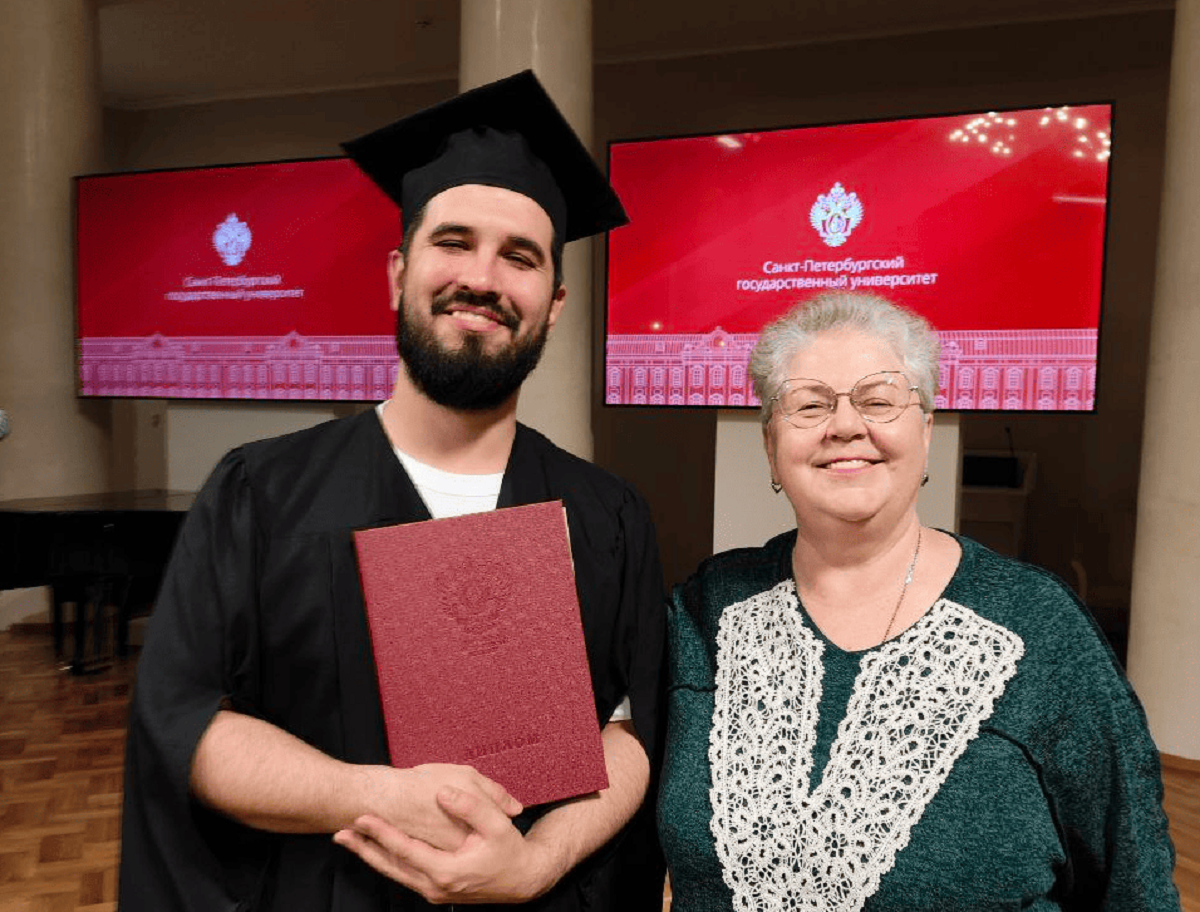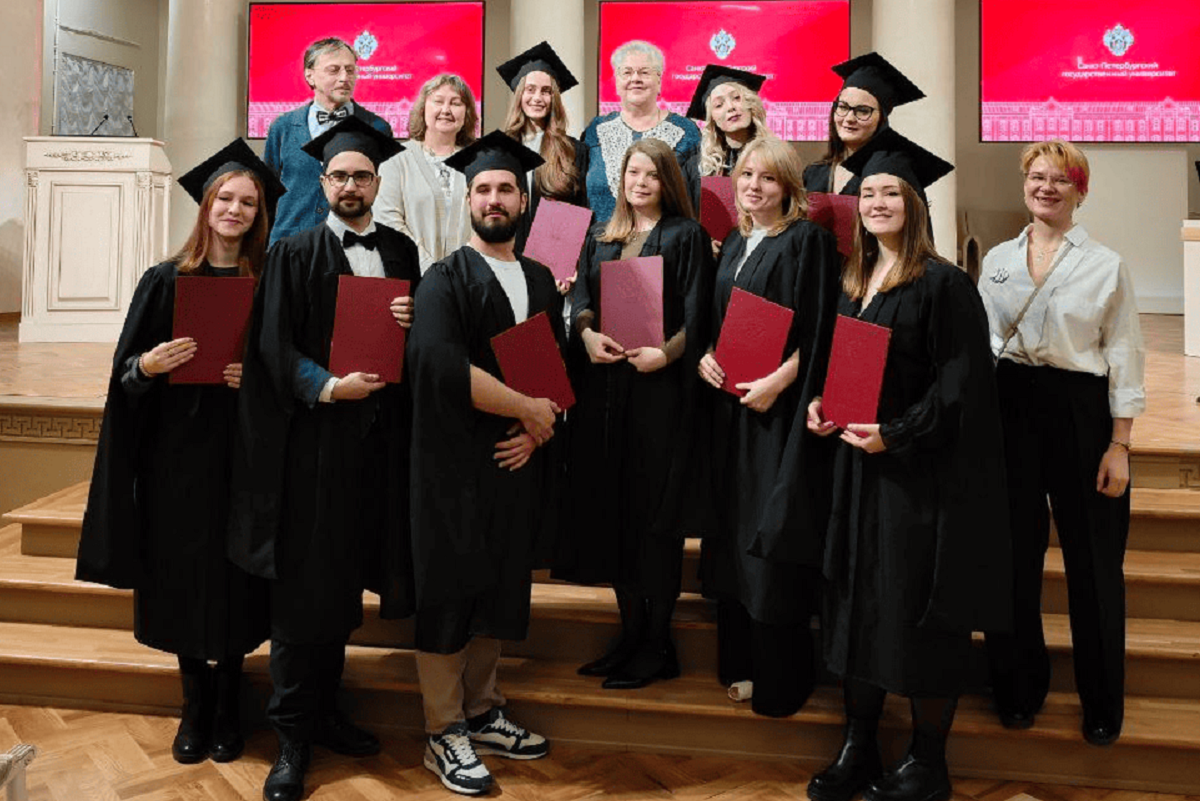"Conventional textbooks and lectures will become things of the past": a graduate of St Petersburg University’s master’s programme explains how and what teachers of the future are taught
In March 2025, Artem Sandakov completed the master’s programme "Educator for High Technology School" and was awarded a master’s degree by St Petersburg University. The programme was developed by researchers and practitioners in modern education from the Institute of Pedagogy at St Petersburg University.

Artem Sandakov discussed his vision of the role of a teacher in the era of neural network development. He also shared insights on balancing master’s studies with full-time work and explained how pedagogical education can benefit a food technologist.
The experience St Petersburg University graduates underscores the demand for specialists in modern education. The programme’s authors, led by Professor Elena Kazakova, Director of the Institute of Pedagogy at St Petersburg University, Doctor of Pedagogy, Corresponding Member of the Russian Academy of Education, aim to educate a new generation of teachers proficient in high-tech professional pedagogy. Graduates of the programme include creators and leaders of major educational projects, such as: the RUSNANO School League; the Educational Centre "Sirius"; and the Presidential Programme for the Training of Management Personnel to name but a few.
Three ingredients for success
According to Artem Sandakov, the key qualities of a modern educator extend beyond subject knowledge. They include the ability to recognise each student’s potential, create an inclusive learning environment, and adapt professional teaching methods to meet individual needs.

"Modern. Open. Sociable. In my opinion, these are the main characteristics of a modern teacher. Modern, because in the 21st century, it makes no sense to 'reinvent the wheel', wasting time on searching for solutions that already exist," explained Artem Sandakov. "Open, because it is crucial for a teacher to be able to understand people of different cultures, communicate with different children and adults, and accept their unique traits. Sociable, because conventional textbooks and lectures will soon become things of the past. Only those teachers who can build rapport with students will carry on, because many tasks will be taken over by a computer."
Artem Sandakov believes that the "Educator for High Technology School" master’s programme trains teachers of the future, equipping them with pedagogical tools that have already proven effective.
In 2016, Artem Sandakov graduated from ITMO University with a bachelor’s degree in "Plant-Based Food Products" and has since worked in the food industry. He discovered the master’s programme "Educator for High Technology School" at St Petersburg University independently, driven by a desire to understand the subtleties of modern education. Now, he sets himself a big goal: to improve the professional development training system within the food industry.
"My first memorable pedagogical experience was at one of my early jobs as a food technologist," shared Artem Sandakov, a graduate of St Petersburg University. "I had to implement a new technology in the production process, ensuring that all plant employees understand it properly and could apply it independently, not just under my supervision. Teaching adults, I admit, is not an experience I would recommend to everyone."
Commitment to continuous learning and professional development has always been one of Artem Sandakov’s core values. He was born in St Petersburg; yet, after graduation he worked in Sevastopol, Yekaterinburg, Moscow and other cities to gain diverse professional experience. His decision to become a teacher and enrol in St Petersburg University was a reason to return to his hometown, especially since the part-time form of education allowed for combining university studies with a full-time job.
The convenient timetable is not the only advantage of the programme, however. It also stands out for its flexible approach with an emphasis on individual work. Students primarily study independently under the guidance of tutors and attend in-person classes a few evenings per week. The programme lasts two years and three months and follows a modular curriculum. After completing every three modules, students take examinations to demonstrate their ability to solve research or project problems.
The biggest challenge is managing your inner "expert"
Artem Sandakov believes that the key to successful teaching is awareness and commitment to continuous self-improvement. He acknowledges that even experienced professionals can encounter challenges in the classroom.
"For me, the most challenging aspect of teaching is avoiding the 'expert' trap," shared Artem Sandakov, a St Petersburg University graduate. "When you have been in a position of greater knowledge than your students for a long time, it is easy to adopt a top-down communication style. And even though, unfortunately, this approach is often considered acceptable in the teaching profession, I try to avoid it."
Artem Sandakov emphasised that self-control and effective management of the inner "expert voice" are crucial in such situations. He acknowledged, however, that this is not always easy. Despite the challenges, he remains hopeful that he can avoid exhibiting an expert position in most cases.
It is precisely for the purpose of developing essential professional competences that the master’s programme "Educator for High Technology School" offered at St Petersburg University takes a comprehensive approach to learning. To help master’s students to overcome initial professional challenges, the curriculum includes both theoretical and practical courses, independent learning, and the defence of a research project. Key courses include: "Theory and Practice of Modern Education"; "Logic of Educational Process Organisation"; "Modern Educational Technologies"; "Methodology and Methods of Research"; and many others.
Currently, the Institute of Pedagogy at St Petersburg University offers two part-time master’s programmes designed to train a new generation of teachers: "Educator for High Technology School" and "Genius: Teacher for Gifted Students". Applicants can participate in the competition for admission, including for government-funded places. This year, applications will be accepted from 20 June to 24 July. Entrance tests will be held from 25 July to 30 July, and classes will begin on 30 September. For detailed admissions and application information, visit the St Petersburg University website for applicants.
Artem Sandakov shared that someday he could become a high school chemistry teacher, but would not spend time on routine tasks like creating and grading homework assignments. Instead, a neural network would handle these functions. This approach, he believes, will enable teachers to focus on the individual needs of students, taking into consideration their experience, interest in the subject, motivation, knowledge level, and desired grades.
"Graduates of the Educator for High Technology School programme are equipped with various tools to automate the teaching and learning processes and teacher’s routine tasks," said Artem Sandakov, who is now a qualified specialist in educational technologies. "I believe that in 50-100 years, all theoretical courses will be studied online, and students will attend school for practical training and hands-on experience. Will there still be a role for live teachers? Absolutely! Their functions will evolve though: they will serve as mentors and mediators, guiding and consulting students, or as experts sharing professional insights and methods for integrating theoretical knowledge in real-world projects."

